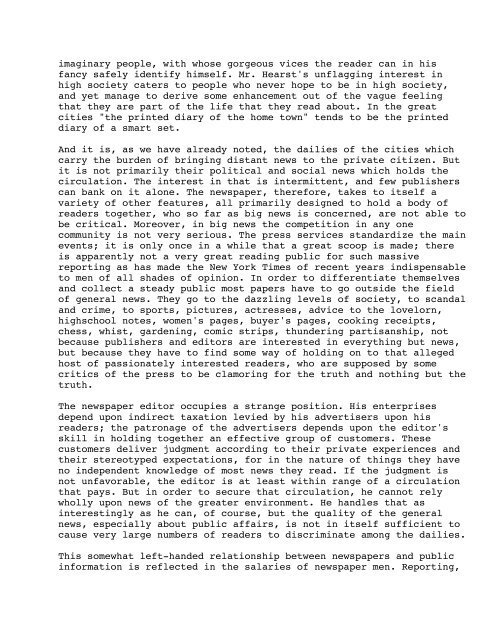PUBLIC OPINION by WALTER LIPPMANN TO FAYE LIPPMANN ...
PUBLIC OPINION by WALTER LIPPMANN TO FAYE LIPPMANN ...
PUBLIC OPINION by WALTER LIPPMANN TO FAYE LIPPMANN ...
You also want an ePaper? Increase the reach of your titles
YUMPU automatically turns print PDFs into web optimized ePapers that Google loves.
imaginary people, with whose gorgeous vices the reader can in his<br />
fancy safely identify himself. Mr. Hearst's unflagging interest in<br />
high society caters to people who never hope to be in high society,<br />
and yet manage to derive some enhancement out of the vague feeling<br />
that they are part of the life that they read about. In the great<br />
cities "the printed diary of the home town" tends to be the printed<br />
diary of a smart set.<br />
And it is, as we have already noted, the dailies of the cities which<br />
carry the burden of bringing distant news to the private citizen. But<br />
it is not primarily their political and social news which holds the<br />
circulation. The interest in that is intermittent, and few publishers<br />
can bank on it alone. The newspaper, therefore, takes to itself a<br />
variety of other features, all primarily designed to hold a body of<br />
readers together, who so far as big news is concerned, are not able to<br />
be critical. Moreover, in big news the competition in any one<br />
community is not very serious. The press services standardize the main<br />
events; it is only once in a while that a great scoop is made; there<br />
is apparently not a very great reading public for such massive<br />
reporting as has made the New York Times of recent years indispensable<br />
to men of all shades of opinion. In order to differentiate themselves<br />
and collect a steady public most papers have to go outside the field<br />
of general news. They go to the dazzling levels of society, to scandal<br />
and crime, to sports, pictures, actresses, advice to the lovelorn,<br />
highschool notes, women's pages, buyer's pages, cooking receipts,<br />
chess, whist, gardening, comic strips, thundering partisanship, not<br />
because publishers and editors are interested in everything but news,<br />
but because they have to find some way of holding on to that alleged<br />
host of passionately interested readers, who are supposed <strong>by</strong> some<br />
critics of the press to be clamoring for the truth and nothing but the<br />
truth.<br />
The newspaper editor occupies a strange position. His enterprises<br />
depend upon indirect taxation levied <strong>by</strong> his advertisers upon his<br />
readers; the patronage of the advertisers depends upon the editor's<br />
skill in holding together an effective group of customers. These<br />
customers deliver judgment according to their private experiences and<br />
their stereotyped expectations, for in the nature of things they have<br />
no independent knowledge of most news they read. If the judgment is<br />
not unfavorable, the editor is at least within range of a circulation<br />
that pays. But in order to secure that circulation, he cannot rely<br />
wholly upon news of the greater environment. He handles that as<br />
interestingly as he can, of course, but the quality of the general<br />
news, especially about public affairs, is not in itself sufficient to<br />
cause very large numbers of readers to discriminate among the dailies.<br />
This somewhat left-handed relationship between newspapers and public<br />
information is reflected in the salaries of newspaper men. Reporting,





